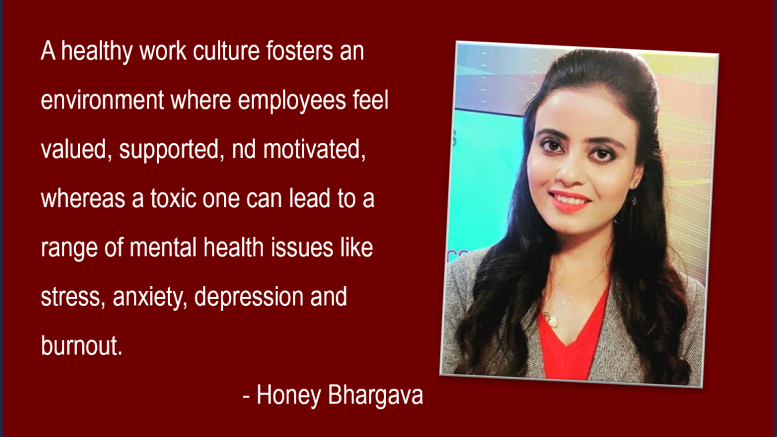Just a week ago, the world observed World Mental Health Day, a day dedicated to shedding light on mental health challenges and advocating for well-being globally. As a PR and branding strategist, I find myself reflecting on the critical connection between work culture, mental health, and productivity, drawing from both personal experiences and observations in the professional realm.
The Indelible Link Between Work Culture and Mental Health
Work culture is far more than just a corporate catchphrase; it embodies the values, attitudes, and behaviors that define an organisation. A healthy work culture fosters an environment where employees feel valued, supported, and motivated, whereas a toxic one can lead to a range of mental health issues like stress, anxiety, depression, and burnout.
Stress and Anxiety: High-pressure work settings, unrealistic expectations, and a lack of work-life balance can culminate in chronic stress and anxiety among employees, creating a continuous strain on their mental well-being.
Depression: Feelings of isolation, undervaluation, or a lack of support within a workplace can spiral into sadness and hopelessness, potentially evolving into clinical depression if not addressed adequately.
Burnout: Prolonged exposure to excessive workloads and emotional exhaustion can result in burnout, characterised by detachment, cynicism, and diminished productivity.
The Far-Reaching Impact on Productivity
Mental health and productivity are intrinsically linked. An unhealthy work culture can significantly impede an individual’s ability to perform at their best, a truth I’ve come to understand both as a strategist and through my own experiences.
Reduced Concentration: Stress and anxiety can diminish an employee’s capacity to concentrate effectively, resulting in decreased efficiency and productivity.
Absenteeism: Mental health challenges often lead to absenteeism, as employees may require time off to manage their conditions. This can disrupt workflow and increase the burden on their colleagues.
Decreased Innovation: A culture that stifles creativity and discourages open communication can stymie innovation and hinder problem-solving skills.
Personal Insights
As a PR and branding strategist, I’ve had the privilege of working with various organisations, and it’s been evident that those nurturing a positive work culture consistently outperform their counterparts. My own journey has also taught me the significance of mental health in the workplace.
I recall a time when I found myself in an environment that seemed to prioritise output over employee well-being. The result was an overwhelming sense of stress and a constant feeling of being on the verge of burnout. Productivity dwindled, and creativity became elusive.
It was only when I transitioned into a more nurturing work culture that I realised the potential that lay within each team member when they felt genuinely valued and supported. Personal experiences like these have shaped my belief in the need for organisations to prioritise mental health.
Overcoming the Challenges
While World Mental Health Day may have passed a week ago, it’s imperative that we continue to address the challenges associated with poor work culture. Here are strategies that individuals and organisations can employ to nurture mental well-being:
Open Communication: Encourage honest dialogues within the organisation, creating channels for employees to voice concerns and provide feedback without fear.
Work-Life Balance: Promote a healthy work-life balance by setting reasonable hours, endorsing breaks, and discouraging excessive overtime.
Training and Awareness: Equip employees with tools and resources to recognise and manage stress and mental health issues while raising awareness about their importance.
Supportive Leadership: Leaders should lead by example and prioritise their mental health, offering resources and support to employees with empathy and compassion.
Employee Assistance Programs (EAPs): Implement EAPs that provide counseling and support services to employees facing mental health challenges.
Workplace Flexibility: Embrace flexible work arrangements, such as remote work or flexible schedules, to accommodate individual needs and reduce stress.
Conclusion
As we reflect on World Mental Health Day, let us remember that mental health remains a vital component of overall well-being. It’s essential to acknowledge the profound impact of work culture on mental health and productivity. By prioritising mental well-being and cultivating a supportive work culture, organisations can elevate employee satisfaction, enhance productivity, and strengthen their brand reputation as employers who genuinely care. The significance of mental health in the workplace is undeniable, and it’s our collective responsibility to continue providing positive change.
The views and opinions published here belong to the author and do not necessarily reflect the views and opinions of the publisher.



Be the first to comment on "Reflecting on World Mental Health Day: The Profound Impact of Work Culture"